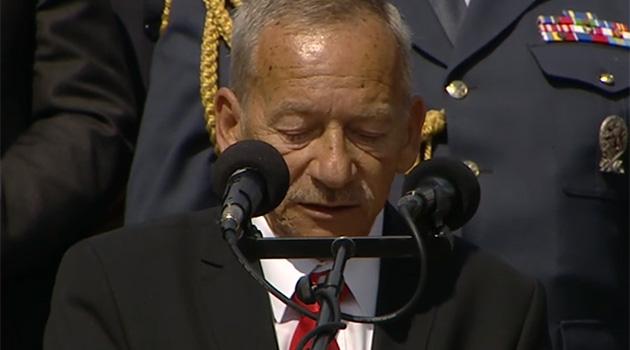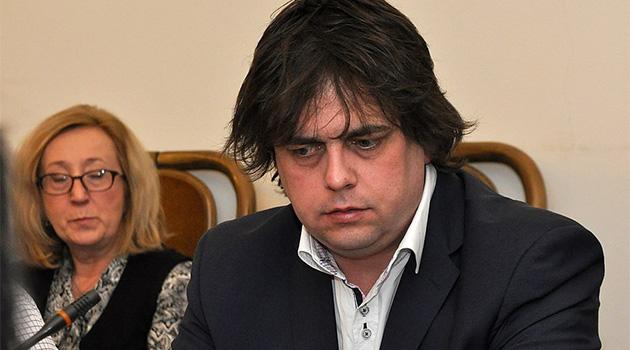Czech Senator compares environmental, gender equality, multiculturalism advocacy to racism and totalitarianism at Holocaust site

President of the Czech Senate Jaroslav Kubera (Civic Democratic Party – ODS), speaking at the Terezín concentration camp memorial today, said that intolerance for other races and totalitarianism are taking on a new form today that is veiled by the words “ecology”, “environment”, “equality of the sexes”, “political correctness” and “multiculturalism”. He also emphasized the necessity of gathering together on days of remembrance at remembrance sites.
Indifference, a lack of interest in public affairs, and passivity, according to Kubera, is creating fertile ground for first an authoritarian and then a totalitarian regime to grow. He was part of a gathering of hundreds of people honoring the memory of the victims of the ghetto at Terezín and the Gestapo prison facility and concentration camp at Litoměřice.
According to the senator, intolerance of other races and totalitarianism are taking on an absolutely different form today. “For example, the form veiled by the words ecology, environment, equality of the sexes, political correctness and multiculturalism,” he said.
Kubera reminded the audience that in 1945, when the National Cemetery was opened at Terezín, Milada Horáková, a former prisoner there in the Small Fortress, spoke on that occasion. “What the Nazis had not accomplished was completed five years later by the Communists, who also couldn’t stand any resistance, any other opinions, any disagreement,” he said, referencing the fact that it was Horáková’s fate to be executed by the Communists after a show trial.
VIDEO
Toman Brod, a former prisoner of the Terezín ghetto, appealed to the younger generation in his remarks. “Make sure that you all never, under any circumstances, succumb to such horrible theories and the practice of collective condemnation, collective disparagement, collective rejection,” he said in a speech that was heard by Czech Prime Minister Andrej Babiš (ANO), Deputy PM Jan Hamáček (Czech Social Democratic Party – ČSSD), Chief Justice of the Constitutional Court Pavel Rychetský, ambassadors, Scouts, and people from abroad and all over the Czech Republic.
During the opening of the ceremony, the director of the Terezín Memorial, Jan Roubínek, called for a minute of silence to honor the memory of his predecessor, Jan Munk. The 72-year-old chair of the Jewish Community of Prague had long been the director of the memorial and passed away a week ago after a long illness.
After speeches were made, a Christian prayer was led by an Episcopal vicar, Jan Balík, followed by a Jewish prayer from the Chief Rabbi of the Czech Republic, Karol Sidon. A memorial ceremony at the former execution ground in the Small Fortress, where the last execution happened at the close of the war on 2 May 1945, took place before the commemoration.
One of those executed by the Nazis on that day was Ladislav Kulhánek, a member of the Prokop Holý resistance organization. His son told the Czech News Agency that he is teaching the younger generation to be proud of themselves.
“I never believed that we were cowardly collaborators, we had people here who fought. For that reason, young people here should stand proud, they should remember there were people here who stood up to evil,” said Kulhánek, whose father was arrested on 24 January 1945.
Organizers of the event have been criticized in the past for including guests and speakers whose political careers exploit disseminating hatred and xenophobia. The Konexe organization said the ceremony in 2018 amounted to a desecration of the site and called for the dismissal of the director of the memorial.
Konexe was bothered last year, for example, by the presence of a delegation from the ultra-nationalist “Freedom and Direct Democracy” (SPD) party of Tomio Okamura; by the speech given by the then-chair of the Czech Freedom Fighters’ Union, Jaroslav Vodička; by Czech MP Jaroslav Foldyna (ČSSD) standing on the main tribunal; by the lack of rabbis; and by the fact that the memorial has refused to include the Romani flag among the others flown during the ceremony. Foldyna was on the main tribunal at the official invitation of director Jan Roubínek.
Speaking in January on public broadcaster Czech Television’s “You Have the Floor” debate program, Foldyna insulted and ridiculed Holocaust victims of Romani origin more than once. He also made the deceptive allegation that the memorial to the concentration camp for Romani people at Lety u Písku was going to cost CZK 1 billion [EUR 38.8 million] and was sharply criticized on social media for his remarks.
During this year’s ceremony at Terezín, Czech MP Jan Hrnčíř (SPD) was standing on the main tribunal. In its regular report on extremism, the Czech Interior Ministry has recently categorized Okamura’s SPD as the main force disseminating hatred and xenophobia in the Czech Republic.
From 1940 to 1945 the Nazis forced more than 200 000 people from many countries all over Europe into the Prague Gestapo’s police prison in the Small Fortress at Terezín, into the ghetto there, and into the concentration camp in nearby Litoměřice. There are 2 386 individual graves as well as more than one pylon beneath which thousands more children, men and women have been buried at what is today the National Cemetery at Terezín.
